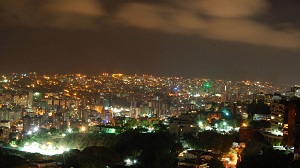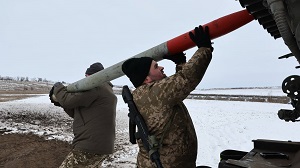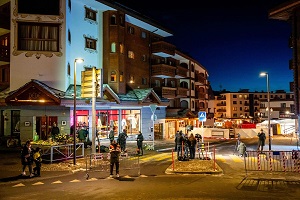Israeli security and the consolidation of Hezbollah's influence in Lebanon - By Ali Al-Amin, Janoubia.com
Stability on the northern borders of Israel is the key objective of Israeli policy on Lebanon and Syria. Israel is enjoying economic prosperity and an exceptional level of development with a growth rate as high as 8%. Its tourism sector is flourishing at a time when Arab countries are facing major challenges, especially those close to the Hebrew state. Most of them are suffering from disasters, as well as political, economic and developmental crises.
Israel rules the roost
It’s enough to point to the war that Syria has been suffering from as it has witnessed displacement, slaughter and devastation. This is in addition to the terrorism that has afflicted Lebanon, Egypt and Jordan in the backdrop of the Syrian crisis. By contrast, Israel has been achieving political advancement and has secured US support, which is proven by the US decision to move its embassy to Jerusalem. The Israeli government has once again imposed its vision of the peace with the Palestinians by eliminating the terms and conditions of the settlement amid the international community’s silence, if we are not to say “acceptance” or “support,” towards this approach.
Israel has not faced any security or strategic threat during the course of the Syrian crisis. At the same time, Syrian and Iranian military positions, as well as Hezbollah targets in Syria, have for many years until today suffered many Israeli attacks, which have not been met with any serious retaliation. In fact, there is coordination between the Israeli government and the Russian forces in this context, as such Israel can target what it considers is a threat to its security in coordination with Russian forces to dodge any clash between them.
All the countries surrounding Israel were and still are subject to tensions, war and terrorism. On the other hand, the state of Israel seems immune to all these problems. Conflicts and clashes have swept across the Syrian landscape, while borders with the Occupied Golan have maintained peace and stability. The missiles of the Syrian regime and its allies, whether Iran or loyal Shiite militias, neither spared any city or town in Syria nor the lives of thousands of civilians. Nevertheless, they have remained orderly and calm in their response to all Israeli assaults against them.
This is what Israel has today: an enemy devoted to guarding its borders so much that it cannot make the mistake of permitting the entry of guerrilla groups to Israel or to launch missiles deep into Israel. This enemy thus settles with making verbal threats which is a condition to protect the status quo. Israel understands this as an essential factor to maintain the current formula which suits its leaders.
On this basis of Israeli calculations, we can deduce the future steps that Israel can take or defer from on matters related to its northern border. As long as Iran and Hezbollah are committed to the terms of stability on its borders as Israel sees fit, both countries’ presence and influence, whether in Lebanon and in Syria, will remain secure against any Israeli threat. Israel thus has no problem if Iran and its militias fight to protect the regime of Bashar al-Assad with all the legitimate and illegitimate weapons and if Hezbollah controls the Lebanese state with its security, military and political institutions as long as this does not threaten its security.
No Iranian reprisal to Israeli strikes
What matters most to Israel is the compliance of both parties to the rules and conditions of Israeli security on the border and protecting stability on both its sides. This explains why Israel, which has presumed there is a potential threat from some Iranian bases in Syria, has launched multiple and deadly missile strikes to destroy these bases. Israel will keep striking these locations as long as Iran keeps bolstering its military presence in areas considered vital to Israeli strategic security. Iran, whom confronting Israel is not among its priorities, will not make any military reactions to retaliate the attacks on its forces or militias in Syria.
The Iranian command is overwhelmed today in other wars and other priorities that have to do with the Arab map on the one hand and the protection of the nuclear agreement, which precludes that it needs to maintain a certain extent of its relations with Europe and Russia, on the other. This of course can’t be achieved if Iran responds to any Israeli strikes on Syria, particularly as long as European countries consider these strikes as Israel’s legitimate right to maintain its security.
As such, Lebanon is not outside this equation. Israel is imposing the security equation on its borders and implementing its strategic conditions which revolve around the fact that it has absolute power in executing whatever it wants towards Jerusalem and the Palestinians. Meanwhile, Hezbollah’s rockets are safe in their storage units not ready to be launched and the way to Jerusalem remains far.
Furthermore, Lebanon is arranging the return of the Hezbollah fighters from Syria in response to Russian President Vladimir Putin’s call to withdraw all militias from Syrian territory. This call will be probably accepted by Hezbollah, if not in the near future then in the long run. The return of these fighters to Lebanon will not be in the context of completing the liberation of Jerusalem, but to preserve the dominance and role of Hezbollah, which will be implemented on the idea of detaching Lebanon from its Arab environment. This power’s military task will not be defending Lebanon in the face of “Arab conspiracies” but it is a task which in the future will allow Hezbollah to justify keeping its weapons.
Iran’s hidden agenda
Israel, which is aware that the guarantees for its security are not only decided by international resolutions or understandings, knows that its security is solidified through the cracks that have permeated the Arab front, particularly in Lebanon and Syria. It is also aware that the priority of Hezbollah today is to control Lebanon, and the long road to attain full control is linked to respecting Israeli security.
The purpose of Hezbollah is no longer liberating Jerusalem or fighting the colonial powers or establishing an Islamic Republic in Lebanon or in Syria and Iraq. Its goal is to protect Iranian influence. This is its plan and it is clear as daylight. This approach leads to controlling the decision centers in the state. Hezbollah is thus taking this path in Lebanon by controlling decision-making, hiding behind the Lebanese state and its institutions, and by, most importantly, reminding Israel and anyone concerned that it is the source of stability in southern Lebanon and northern Israel, and to proclaim that it, i.e. Hezbollah, and no one else, can provide this stability.




